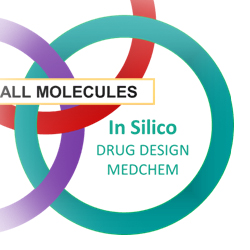
Computational Aided Drug Design
Protein kinases have recently emerged as relevant targets for the treatment of diseases ranging from cancer, inflammation and cardiovascular condition to immune related disorders. Thus, over the past decade, more than thirteen small molecule kinase inhibitors have been approved by the FDA as therapeutics for various human pathologies. In this context, receptor tyrosine kinases play a prominent role, as they are involved in a number of biologically relevant processes for cancer development including oncogenic regulation, cell signal transduction, proliferation and survival among many others.
Synthesis of Novel Chemotype of Tyrosine Kinase Inhibitors by Fragment-Based Docking and Molecular Dynamics
In collaboration with the group of Prof. Amedeo Caflisch, we have discovered a novel chemical class of inhibitors of the EphB4 tyrosine kinase by fragment-based high-throughput docking followed by explicit solvent molecular dynamics simulations for assessment of the binding mode. Computational-guided hit to lead optimization yielded single digit nanomolar inhibitors in both enzymatic and cell-based assays while preserving the appealing selectivity profile exhibited by the parent compound. In addition, respectable levels of antiproliferative activity for these compounds have been obtained. Finally, the binding mode predicted by docking and molecular dynamics simulations was validated by solving the crystal structures of three members of this chemical class in complex with the EphA3 tyrosine kinase whose ATP-binding site is essentially identical to that of EphB4. The most promising compounds are being pursued for validation in suitable in vivo models.
Publications:
-
K. Lafleur, D. Huang, T. Zhou, A. Caflisch, C. Nevado
J. Med. Chem. 2009, 52, 6433 -
D. Huang, P. Kolb, C. Nevado, A. Caflisch
(2009), WO 2009092602 -
D. Huang, T. Zhou, K. Lafleur, C. Nevado, A. Caflisch
Bioinformatics 2010, 26, 198 -
K. Lafleur, D. Huang, C. Nevado, A. Caflisch
(2011), WO 2011009695 -
H. Zhao, J. Dong, K. Lafleur, C. Nevado, A. Caflisch
ACS Med. Chem. Lett. 2012, 3, 834 -
K. Lafleur, J. Dong, D. Huang, A. Caflisch, C. Nevado
J. Med. Chem. 2013, 56, 84
